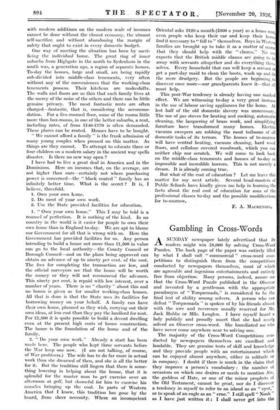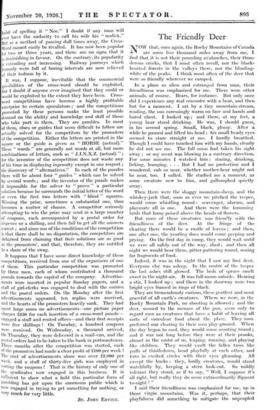Gambling in Cross-Words
ASUNDAY newspaper lately advertised that if; readers might win £8,000 by solving Cross-Word Puzzles. The back page of the paper was entirely Ott{ by what I shall call " commercial " cross-word com- petitions to distinguish them from the competitions conducted by newspapers themselves, most of which are agreeable and ingenious entertainments and entirely free from objection. Many persons, indeed, assure me that the Cross-Word Puzzle published in the Observer and invented by a gentleman with the appropriate pseudonym of " Torquemada," is considered to be the final test of ability among solvers. A person who can defeat " Torquemada " is spoken of by his friends almost with the awe and reverence usually reserved for Mr. Jack Hobbs or Mlle. Lenglen. I have myself heard a lady publicly and proudly assert that she had nearly solved an Observer cross-word. She humiliated me who have never come anywhere near to solving one.
The majority of the Cross-Word Competitions con• ducted by newspapers themselves are excellent and laudable. They are genuine tests of skill and knowledge and they provide people with an entertainment which can be enjoyed almost anywhere, either in solitude or in company. I doubt if there is much in the claim that they improve a person's vocabulary : the number of occasions on which one desires or needs to mention Ate, the goddess of Hate, or one of the minor prophets of the Old Testament, cannot be great, nor do I discover a tendency in myself to refer to an island as an " eyot," or to speak of an eagle as an " erne." I still spell " Noah " as I have just written it : I shall never get into the habit of spelling it " Noe." I doubt if any man will ever have the audacity to call his wife his " mulick." But as a method of passing dull times away, the Cross- Word cannot easily be rivalled. It has now been popular for two or three years, and there are no signs that it is diminishing in favour. On the contrary, its popularity is extending and increasing. Railway journeys which formerly were full of boring intervals are now relieved of their tedium by it.
It was, I suppose, inevitable that the commercial possibilities of the cross-word should be exploited, but I doubt if anyone ever imagined that they, could or would be exploited to the extent they have been. Cross- word competitions have become a highly profitable enterprise to certain speculators ; and the competitions promoted by these persons make the least possible demand on the ability and knowledge and skill of those who take part in them. They are gambles. In most of them, clues or guides that seem difficult to follow are actually solved for the competitors by the promoters of the competition. Either the letters are printed in the square or the guide is given as " HORSE (actual)." These " words " are generally not words at all, but mere combinations of letters, such as " J.I.N.X.Z. (actual) " ; for the inventor of the competition does not waste any of his time in displaying ingenuity except in one respect ; the discovery of " alternatives." In each of the puzzles there will be about four " guides " which can be solved by several words ; and the inventor of the puzzle makes it impossible for the solver to " prove " a particular solution because he surrounds the initial letter of the word or even the first two letters with " blind " squares. Winning the prize, sometimes a substantial one, thus becomes a matter of chance. A competitor seriously attempting to win the prize may send in a large number of coupons, each accompanied by a postal order for sixpence or a shilling, and then fail to get all the answers correct ; and since one of the conditions of the competition is that there shall be no disputation, the competitors are debarred from claiming that their solutions are as good as the promoters', and that, therefore, they are entitled to a share of the swag.
It happens that I have some direct knowledge of these competitions, received from one of the organizers of one of them. This particular competition was promoted by three men, each of whom contributed a thousand pounds towards the capital of the company. Advertise- ments were inserted in popular Sunday papers, and a staff of girl-clerks was engaged to deal with the entries and the postal orders. On the Monday after the first advertisements appeared, ten replies were received, and the hearts of the promoters heavily sank. They had spent large sums on advertisements—one picture paper charges £250 for each insertion of a cross-word puzzle— engaged a staff and rented offices—and their first receipts were five shillings ! On Tuesday, a hundred coupons were received. On Wednesday, a thousand arrived. On Thursday, they were delivered in a mail-van, and the postal orders had to be taken to the bank in portmanteaus. Three months after the competition was started, each of the promoters had made a clear profit of £100 per week ! The cost of advertisements alone was over £2,000 per week, and a staff of thirty-five girls was employed in sorting the coupons ! That is the history of only one of the syndicates now engaged in this business. It is sufficient to show what a hold this particular form of gambling has got upon the enormous public which is now engaged in trying to get something for nothing, or Very much for very little.
ST. JOIIN ERVINE.































































 Previous page
Previous page